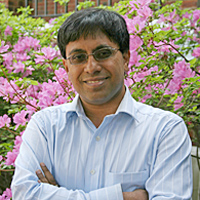Home > Press > FEST Award Promotes Innovative Nanoelectronics Research
 |
| Avik Ghosh
(Photo: Melissa Maki) |
Abstract:
Avik Ghosh, assistant professor of electrical and computer engineering at the University of Virginia, recently won an internal Fund for Excellence in Science and Technology Distinguished Young Investigator Grant for a research proposal that could ultimately transform transistor technology.
FEST Award Promotes Innovative Nanoelectronics Research
Charlottesville, VA | Posted on May 28th, 2008Transistors are tiny devices that control electric current and voltage. Considered a pivotal invention of the 20th century, they are a key component of computer chips as well as most other modern electronic devices. Currently available transistors are comprised of silicon, but the demand for smaller and more powerful electronic gadgets has uncovered the limitations of silicon transistor technology, including problems with heat dissipation and processing speed.
Enter Ghosh, who specializes in evaluating the properties of materials at the nanoscale by using high-powered computational techniques and physics. Ghosh notes that researchers have been working for years to scale down transistors and make them faster, cheaper and more reliable. One approach to this challenge involves the exploration of new materials.
One of the most recent materials to show theoretical promise is the graphene nanoribbon — a ribbony layer of graphite that is only an atom thick. Ghosh's FEST-backed research will explore the properties of graphene nanoribbons to determine whether they may consistently provide advantages in electrical conductivity that would rival silicon. Initial research has shown that graphene nanoribbons may enable devices with superior electrical properties, potentially resulting in transistors that are intrinsically much faster than those that are currently available.
Ghosh's expertise is in modeling and simulation on the atomic scale, and he has already established both internal and external collaborations in physics, chemistry and materials science to assist with his ambitious research. "Our group is theoretical, but we partner with experimentalists who are trying to build devices," said Ghosh. "We need experiments both to benchmark our theories and to test our predictions."
With the FEST funding, Ghosh will be able to hire a graduate student for a year to get the initial results and proof of concept to establish the capabilities of graphene-based devices and a fuller understanding of their advantages and disadvantages. Ghosh's goal is to be able to pattern an entire circuit out of graphene, using a combination of existing practices and new techniques.
Research on graphene-based devices has gained momentum of late, but Ghosh believes his holistic, interdisciplinary approach, which is focused on electronics applications, makes his work stand out from the rest. "What's unique about us is that we are actually partnering with experimentalists and the circuit theorists and trying to get a total story about graphene, not just a piecemeal part of the story," he said.
The FEST Distinguished Young Investigator Grant Program is administered by U.Va.'s Office of the Vice President for Research and Graduate Studies and supports junior faculty research in the sciences, engineering and medicine.
More information about Ghosh's work and other related research can be found on the Virginia nano-computing Web site (www.ece.virginia.edu/vino/home.html).
####
For more information, please click here
Contacts:
Melissa Maki
(434) 243-2203
Copyright © University of Virginia
If you have a comment, please Contact us.Issuers of news releases, not 7th Wave, Inc. or Nanotechnology Now, are solely responsible for the accuracy of the content.
| Related News Press |
News and information
![]() Simulating magnetization in a Heisenberg quantum spin chain April 5th, 2024
Simulating magnetization in a Heisenberg quantum spin chain April 5th, 2024
![]() NRL charters Navy’s quantum inertial navigation path to reduce drift April 5th, 2024
NRL charters Navy’s quantum inertial navigation path to reduce drift April 5th, 2024
![]() Discovery points path to flash-like memory for storing qubits: Rice find could hasten development of nonvolatile quantum memory April 5th, 2024
Discovery points path to flash-like memory for storing qubits: Rice find could hasten development of nonvolatile quantum memory April 5th, 2024
Nanoelectronics
![]() Interdisciplinary: Rice team tackles the future of semiconductors Multiferroics could be the key to ultralow-energy computing October 6th, 2023
Interdisciplinary: Rice team tackles the future of semiconductors Multiferroics could be the key to ultralow-energy computing October 6th, 2023
![]() Key element for a scalable quantum computer: Physicists from Forschungszentrum Jülich and RWTH Aachen University demonstrate electron transport on a quantum chip September 23rd, 2022
Key element for a scalable quantum computer: Physicists from Forschungszentrum Jülich and RWTH Aachen University demonstrate electron transport on a quantum chip September 23rd, 2022
![]() Reduced power consumption in semiconductor devices September 23rd, 2022
Reduced power consumption in semiconductor devices September 23rd, 2022
![]() Atomic level deposition to extend Moore’s law and beyond July 15th, 2022
Atomic level deposition to extend Moore’s law and beyond July 15th, 2022
Announcements
![]() NRL charters Navy’s quantum inertial navigation path to reduce drift April 5th, 2024
NRL charters Navy’s quantum inertial navigation path to reduce drift April 5th, 2024
![]() Discovery points path to flash-like memory for storing qubits: Rice find could hasten development of nonvolatile quantum memory April 5th, 2024
Discovery points path to flash-like memory for storing qubits: Rice find could hasten development of nonvolatile quantum memory April 5th, 2024
Grants/Sponsored Research/Awards/Scholarships/Gifts/Contests/Honors/Records
![]() Discovery points path to flash-like memory for storing qubits: Rice find could hasten development of nonvolatile quantum memory April 5th, 2024
Discovery points path to flash-like memory for storing qubits: Rice find could hasten development of nonvolatile quantum memory April 5th, 2024
![]() Chemical reactions can scramble quantum information as well as black holes April 5th, 2024
Chemical reactions can scramble quantum information as well as black holes April 5th, 2024
|
|
||
|
|
||
| The latest news from around the world, FREE | ||
|
|
||
|
|
||
| Premium Products | ||
|
|
||
|
Only the news you want to read!
Learn More |
||
|
|
||
|
Full-service, expert consulting
Learn More |
||
|
|
||








